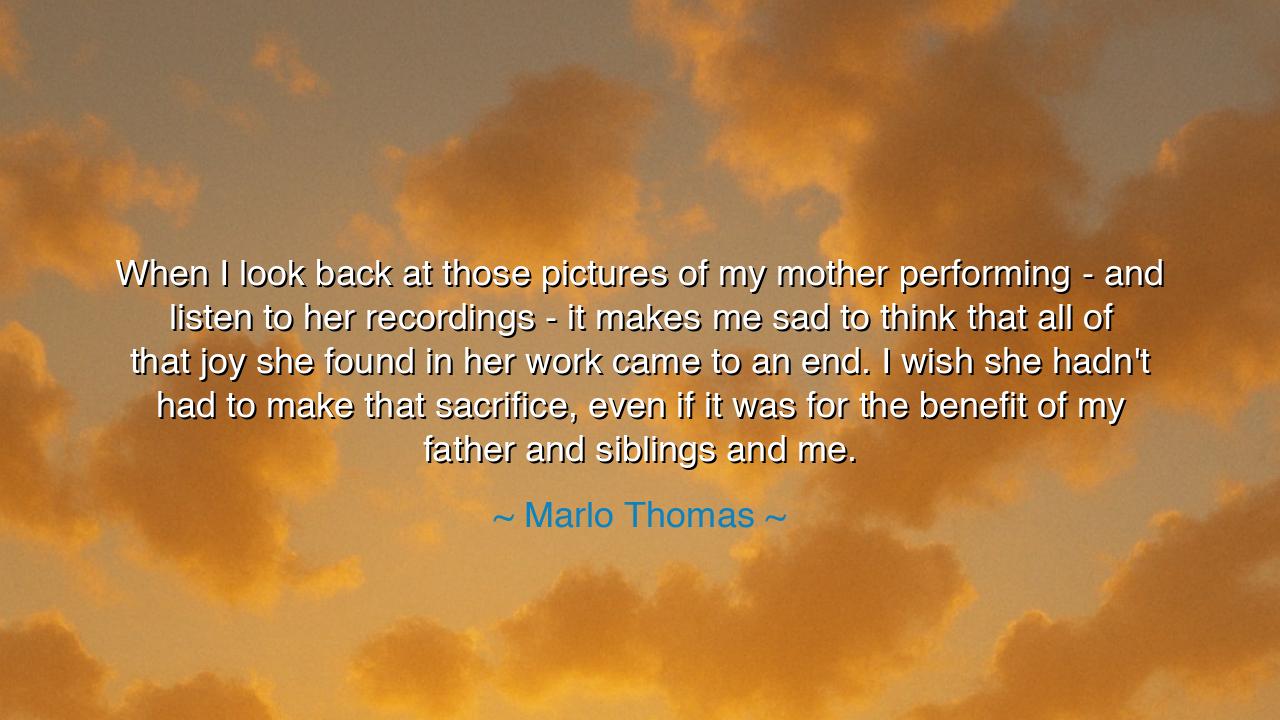
When I look back at those pictures of my mother performing - and
When I look back at those pictures of my mother performing - and listen to her recordings - it makes me sad to think that all of that joy she found in her work came to an end. I wish she hadn't had to make that sacrifice, even if it was for the benefit of my father and siblings and me.






When Marlo Thomas said, “When I look back at those pictures of my mother performing—and listen to her recordings—it makes me sad to think that all of that joy she found in her work came to an end. I wish she hadn’t had to make that sacrifice, even if it was for the benefit of my father and siblings and me,” she was speaking not only of her mother, but of the countless souls who have given up their own light for the sake of love and duty. Her words are tender and heavy, a daughter’s lament wrapped in reverence. In them lies the eternal story of sacrifice—the giving up of one’s own dreams for the nourishment of others—and the bittersweet truth that even love, when burdened by duty, can wound the giver’s spirit.
Her mother, Rose Marie Mantell Thomas, was once a performer, a woman who had known the stage, the applause, and the joy of creation. Yet, as many women of her time, she laid down her passion to raise a family, to serve the life of her husband, the beloved entertainer Danny Thomas, and to nurture her children. Marlo’s sorrow is not born of ingratitude but of recognition—that her mother’s sacrifice, though noble, came at a cost. The laughter and music that once filled the stage were replaced by the quieter rhythms of domestic devotion. In remembering her mother’s lost art, Marlo does what the ancient poets once did—she mourns the silent heroism of the unseen and unsung.
The meaning of her reflection runs deeper than nostalgia. It is a meditation on the dual nature of love: that to give fully to others often requires the death of something within oneself. The ancients told this truth through myth and song. In the legend of Demeter, the goddess of the harvest loses her daughter Persephone to the underworld. In her grief, she withholds the fruits of the earth until the world itself begins to starve. Yet when mother and daughter are reunited, life returns to bloom. Like Demeter, Rose Thomas sacrificed her creative springtime so that her children could grow—and Marlo, in her wisdom, sees both the beauty and the tragedy of that exchange.
Throughout history, the world has been shaped by such silent sacrifices. Clara Schumann, one of the greatest pianists and composers of the nineteenth century, set aside her own genius to support her husband, the composer Robert Schumann, and raise their children. Though her talent equaled his, her name was overshadowed by duty. She became the keeper of another’s legacy, while her own slowly faded from the public ear. The same echo of sadness lives in Marlo Thomas’s words: the sorrow that talent, when buried under obligation, becomes a ghost that haunts the heart.
And yet, within her sadness, there is also reverence. She honors her mother’s choice not as weakness, but as courage—the strength to put love above ambition, and family above fame. The ancients would have called this the virtue of sacra caritas—the sacred love that gives without counting the cost. It is this kind of love that sustains generations, though it often leaves the giver forgotten. Marlo’s grief is not rebellion against that truth; it is a prayer that the world might learn to value such gifts without demanding them.
The deeper wisdom of her words also speaks to the need for balance. The lesson is not that one should forsake family for art, nor art for family, but that no one—especially no woman—should be forced to choose between them. A society that honors only one form of devotion while neglecting the other breeds quiet sorrow. The next generation must learn to preserve both the heart and the flame—to make room for the artist and the mother, the dreamer and the caretaker. For when joy is preserved in both, the family itself becomes stronger and more alive.
So, let this be the teaching drawn from her reflection: cherish those who have sacrificed for you, but do not let their sacrifices be repeated in vain. Learn from them the beauty of giving, but also the necessity of nurturing your own light. To honor the past is not to imitate its silence, but to rise from it with gratitude and renewal. Marlo Thomas’s grief becomes our guidance: that love should never demand the death of joy, and that the truest families are built not on sacrifice alone, but on the shared freedom to be fully, gloriously alive.






AAdministratorAdministrator
Welcome, honored guests. Please leave a comment, we will respond soon